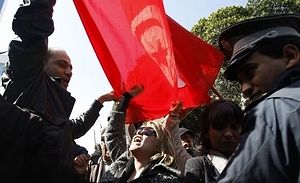Tunis, 20 march 2012
 Thousands of secular Tunisians marched in the capital to show their rejection of growing calls by conservative Salafi Islamists to transform post-revolutionary Tunisia into an Islamic state. (Reuters)
Thousands of secular Tunisians marched in the capital to show their rejection of growing calls by conservative Salafi Islamists to transform post-revolutionary Tunisia into an Islamic state. (Reuters)
Carrying Tunisia’s red and white flag, several thousand protesters filled Bourguiba Avenue, a focal point of protests that ousted strongman Zine al-Abidine Ben Ali on Jan. 14 last year and sparked the “Arab Spring” uprisings.
“We came in our thousands to say to those who want to change the course of the revolution that we will confront you,” said rights activist Jaber Ben Hasan, amid chants of “the people want a civil state”.
“We are here to bring victory to the civil state,” he said, referring to a state that was not governed by religious law.
While Islamists did not play a prominent role in the 2011 uprising, a struggle over the role of religion in government has since polarized politics in Tunisia, a country that has long been considered one of the Arab region’s most secular.
Some Islamist MPs want Tunisia’s new constitution, which is being hashed out by a constituent assembly elected in October, to name sharia, or Islamic law, as the principal source of legislation in the new document.
Secularists oppose such demands and worry that Islamists will seek to impose their views, raising social pressure on women to wear the veil or restaurants to stop serving alcohol and ultimately transforming the Mediterranean tourist destination into a conservative Islamic state.
Tunisia’s existing constitution names Islam as the religion of state but does not name sharia as a source of lawmaking.
“We will not allow a minority that was not even present before Jan. 14 to impose its views on us,” said Hala Rafrafi, a protester with a Tunisian flag wrapped around her shoulders.
“It is wrong that after 56 years of independence we are still here calling for a civil state. This issue should have already been decided, but the state will be civil.”
Room for all
While most Tunisians are Muslims, Tunisia has a long secular legacy, though one which has been tarnished by association with Ben Ali and his predecessor Habib Bourguiba, both dictators.
Many women shun the veil and defend legal rights in marriage and divorce that are among the region’s most progressive.
While the moderate Islamist Ennahda won October elections and now heads the government, it has chosen to rule in coalition with two secular parties and has promised not to ban alcohol or impose the veil as some secularists had initially feared.
However, many secularists now worry that Ennahda is instead turning a blind eye to hardline Salafi Islamists, who have become more assertive since the uprising.
Tuesday’s protest comes just days after a coalition of religious associations held a large rally outside Tunisia’s parliament building to demand an Islamic state.
It coincides with the day that Tunisians mark the anniversary of their independence from France in 1956.
Many Islamists blame the French for bringing secular ideas to Tunisia, and independence hero and first president Bourguiba for closing the ancient Islamic college of Zaitouna and trying to build a modern state in which religion had a much diminished influence on politics and society.
Speaking at an independence day ceremony at the presidential palace overlooking the Mediterranean, President Moncef Marzouki said the new Tunisia should represent all citizens and urged both sides not to complicate the transition by pulling further apart.
“The nation cannot be built with one color,” said Marzouki, a physician and veteran human rights activist before he became president after the revolution.
“Tunisia will pay a heavy price in blood and tears if it has to confront by force extremists from all sides.”
Source: Al Arabiya News
